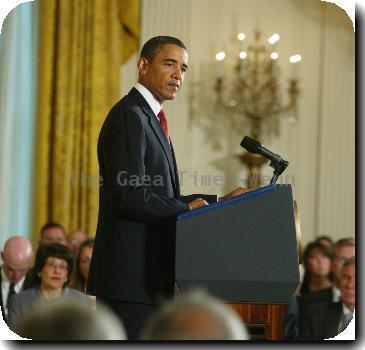Ill. Republicans say stars are aligned for victory, as Dems contend with Blagojevich, deficit
By Deanna Bellandi, APWednesday, February 17, 2010
Illinois Republicans see unique chance for victory
CHICAGO — The last decade was lousy for Illinois Republicans. They lost a Senate seat, their party’s last governor went to prison and they were shut out of every statewide office.
But the recent surprise win by Scott Brown in the Massachusetts Senate race and a string of setbacks for Illinois Democrats have Republicans giddy about their chances to claim the next big election prizes: President Barack Obama’s former Senate seat and ousted Gov. Rod Blagojevich’s old job.
Republicans have reason to feel confident. This year’s races are likely to be fought against the backdrop of Blagojevich’s corruption trial — a point Republicans are sure to belabor — and Illinois’ finances are in shambles, with the state deficit likely to reach $13 billion this year.
“This year the stars seem to be lining up for us,” Illinois Republican Party chairman Pat Brady said.
If Republicans can’t win in Illinois this year, it’s hard to imagine when they could be victorious in the state, where Democrats control the governor’s mansion, every statewide office and the Legislature.
“If the Republicans don’t win in November, we’re in for a long, long decade,” said state Sen. Kirk Dillard, of Hinsdale, who is hoping to be the Republican candidate for governor.
The GOP is counting on five-term U.S. Rep. Mark Kirk, a moderate on issues like gun control and abortion, to win Obama’s old Senate seat.
Kirk, 50, is up against 33-year-old Democrat Alexi Giannoulias, Illinois’ first-term state treasurer whose last job was at his family’s bank that is now in financial trouble. Sen. Roland Burris, who was appointed to Obama’s seat by the scandal-tainted Blagojevich, opted not to run for a full term.
In the Illinois governor’s race, the Republicans still haven’t settled on a nominee — the Feb. 2 primary ended in a virtual tie with state Sen. Bill Brady of Bloomington just a few hundred votes ahead of Dillard. But Democratic Gov. Pat Quinn is vulnerable for several reasons, not least of which is his proposal to raise income taxes to help close the whopping budget deficit.
Quinn’s decision to release some inmates early from prison also turned into a public relations disaster that his Democratic challenger used to nearly win the party’s nomination this month. And the party suffered yet another black eye when its nominee for lieutenant governor, Scott Lee Cohen, dropped out after it became widely known that he was accused of abusing his ex-wife and arrested for holding a knife to the throat of an ex-girlfriend. Cohen has denied the allegations, and charges stemming from his arrest were dropped when the girlfriend did not show up in court.
“Every Democrat I know, every politically knowledgable and interested Democrat is worried. The combination of factors is potentially pretty lethal,” said John Schmidt, a Chicago attorney who ran unsuccessfully in 1998 for the Democratic nomination for governor. Schmidt supported Quinn’s opponent in the primary.
But the Republican outlook isn’t entirely rosy. The party is no stranger to scandal — voters will remember that the last Republican governor, George Ryan, was sent to prison for racketeering and fraud. And Quinn got lucky when Cohen resigned; he will help choose his own running mate.
Furthermore, if Brady emerges as the GOP nominee, the party will have to sell a conservative downstate lawmaker to Chicago-area voters he barely courted during his primary campaign. Brady received only 5 percent of the GOP vote in Cook County, where Chicago is located.
Illinois Democrats have echoed their national party’s claim that for all the Republican Party’s criticism, it hasn’t offered real solutions for fixing the economy and getting people back to work. Democrats point out they got rid of Blagojevich when he was arrested, they passed a major public-works program after years of gridlock and they approved significant ethics legislation.
“What are their solutions beyond being the party of no?” said Rep. David Miller, the Democratic nominee for Illinois comptroller. “I think people don’t want to see partisan bickering right now. People are looking for solutions.”
Quinn, like several other Democrats, said voters must be reminded that the Republicans’ no-tax-increase pledge would require devastating budget cuts to health care and human services.
“We can’t allow them to win,” Quinn said.
Associated Press Writer Christopher Wills in Springfield contributed to this report.
Tags: Barack Obama, Chicago, Geography, Illinois, North America, Political Corruption, Political Issues, Political Organizations, Political Parties, Primary Elections, United States









